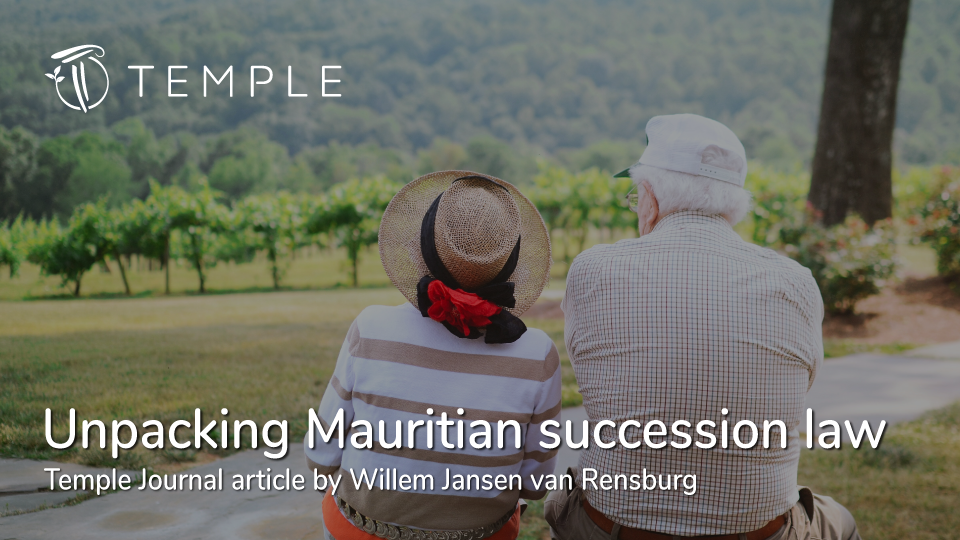Moving to another country comes with a lot of planning and stress. So does investing internationally. But one of the often-neglected considerations is how your assets in your new country of residence will be dealt with when you pass away. This gets even more complicated if you have assets in more than one country: which country’s laws will apply to these various assets? Can they be dealt with in one Will? Who will administer it all?
In countries like the UK, the USA and South Africa, testators have almost absolute freedom to choose what happens to their assets after their death – in many cases up to the extreme of bequeathing everything to the family poodle. Unless you come from a country like France, Germany, Italy, Spain or Switzerland, chances are that you have never heard of the concept of forced heirship. Mauritius inherited from French law in this regard, and this means that forced heirship applies. There is a major distinction between these two systems and it’s crucial to determine which system will apply to your estate, and plan accordingly.
To determine this, a distinction has to be drawn between movable and immovable property. The principles of Lex rei sitae and Lex Domicilii exist under private international law. Lex rei sitae applies to immovable property, meaning that the inheritance of immovable property is governed by the law where the property is located. This means that your villa or apartment will be governed by Mauritian law if the villa or apartment is situated in Mauritius in which case forced heirship will apply to this part of your estate.
Thus, the mere fact that a person resided in Mauritius at the time of their death, by itself does not mean that forced heirship rules will apply to their estate. If the deceased are considered to be domiciled elsewhere, and have no immovable property in Mauritius, forced heirship rules may not apply to the estate at all.
But what is forced heirship? In direct contrast with the principle of total freedom of testation, forced heirship creates categories of heirs that are protected (their share is referred to as the “reserved portion”), and thus have an irrevocable right to a part of the deceased’s estate. The testator is only free to deal with the remainder, or “unreserved portion”. In the first order, the protected heirs are the children of the deceased. If there is one child, the reserved portion is half of the estate, meaning that the child will be entitled to half and the testator can bequeath the other half freely. If there are two children, the reserved portion is two thirds, and if there are three or more children, it’s three quarters. Seen from the other angle, this means that a testator can only freely bequeath half, a third or a quarter of the estate in the above scenarios.
One effect of forced heirship is that the testator cannot disinherit a child – children have an automatic right to the reserved portion. There has to be a biological link (all biological children whether born in or out of wedlock) or a legal link (adoption) though. What is also important to note is that a spouse is not a protected heir and can thus only hope to share in the unreserved portion
For instance, if a man has two children and a spouse, and dies without a Will, all three will inherit in equal portions. This is because the children will get two-thirds by virtue of it being their reserved portion, and the wife will get the available portion by virtue of intestate succession law. If the man does make a Will, the two children will still get their two-thirds reserved portion, but the wife has no vested right to inherit. Although she is not entirely without rights (she will for instance have a right of usufruct (use and enjoyment) over the matrimonial home), this one-third of the estate can be bequeathed to anyone. The husband can choose to give it to the spouse, or to divide it between the two children on top of what they already have, or even favour one child by giving it all to him/her. Alternatively, he can give it to someone else entirely (though not the poodle, under Mauritian law).
Certain questions arise: What if a property is in the name of both spouses, or if they are married under the regime of community of property. The key here is to keep in mind that a person can only pass on that which they own. It follows that if a property is registered in the names of both spouses or they share it by virtue of their marriage regime the surviving spouse’s share is not affected by the death of the other spouse. In the example above, the two children will each get their third of their father’s half share, and the other third of his half share will go where he pleases. The surviving spouse will continue to have her own half share, plus whatever she inherits from the husband.
Also, what is the situation regarding a blended family, where spouses have children from their own marriage but also from previous marriages? Insofar as children are concerned, the key is to keep in mind the legal or blood-relationship requirement. If a husband and wife have one child together, and each have another child from a previous marriage, then that common child will always have an advantage over the other two. If the husband passes away, his two biological children will be entitled to the reserved portion, but the wife’s child will not be entitled to anything, and vice versa. Of course, nothing prevents them from allocating the remaining portion to the other child, but this is in their absolute discretion. If both parents pass away, the common child will inherit from the reserved portion of both parents, whilst the other two will only be entitled to the reserved portion of their own parent.
There are not many ways around these rules. Children (except minors) can renounce their portions if they so choose, which may be important from an international perspective. Say a Will made in the UK dictates that Peter will get the house in London, Sue will get the house in Cape Town and Jack will get the one in Mauritius: in this case, this intention to provide each child with their own house will not realise. Although Peter and Sue will each get their own houses (in London and Cape Town), the house in Mauritius will be shared by all the children, regardless of the Will. Each child has a 25% stake by virtue of forced heirship, and the most Jack can own is half of the property (25% as his right to the reserved portion and 25% as bequeathed by him in the Will). The only way Jack will be entitled to the whole property, is if Peter and Sue both renounce their portions of the Mauritius house. In light of this, the testator might want to change his Will to stipulate that Peter and Sue will be entitled to their respective houses only if they renounce their stake in the Mauritius house, so that Jack can inherit it, or alternatively the children will each have an undivided and equal stake in all three properties.
From this example it is clear that forced heirship does not only affect property in Mauritius (and the Mauritian Will), but may also impact the overall strategy of a testator with multiple properties in various jurisdictions.
Trusts are great and popular tools for estate planning too. One of the benefits of a trust is that the trust property is removed from the settlor and no longer forms part of their estate and are thus not subject to succession rules (or estate taxes in countries where these apply). To be successful in this respect, the trust must be set up in the right way though, and it is essential that the settlor must give up real control of the assets to the trustees.
In conclusion, succession planning is a tricky subject at best. But when forced heirship is added to the equation, this can throw the whole plan off track. Some heirs may inadvertently be better or worse off than others, and this applies especially to the spouse, who is not a protected heir. It’s therefore important to understand which country’s laws will be applicable to your estate, especially if more than one set of laws apply. Once this is determined, it may be worth taking a second look at the overall picture. Does the overall result achieve what the testator wanted? Should there be a separate Will in each country, to deal with the assets in that country? Should everything be put in a trust? These questions will be answered in future issues.
Read the full Temple Journal here: https://www.temple.mu/temple-journal/
About the authors:

WILLEM JANSEN VAN RENSBURG
FOREIGN LAWYER – TEMPLE LAW
DIRECTOR OF OPERATIONS
Willem has over 20 years of legal experience, mostly leading his own firm in South Africa. After moving to Mauritius in 2018, he completed a Master’s in International Business Law and became Director of Operations at Temple Law. Practising in Mauritius for five years, Willem remains on the roll of attorneys in South Africa. Initially a property conveyancer, he is now a versatile lawyer specialising in international commercial law and the African market. In 2024, he was appointed Chair of the African Leadership Group of Meritas Law Firms Worldwide.




